
Chukwuemeka "Emeka" Odumegwu Ojukwu was a Nigerian military officer and politician who served as President of the Republic of Biafra from 1967 to 1970 during the Nigerian Civil War. He previously served as military governor of the Eastern Region of Nigeria, which he declared as the independent nation of Biafra.
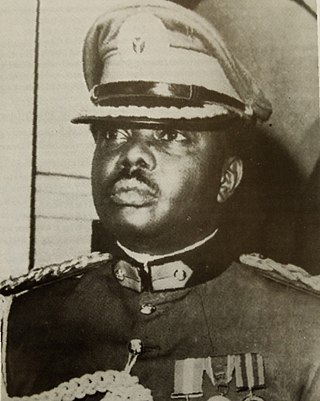
Murtala Ramat Muhammed ; 8 November 1938 – 13 February 1976) was a Nigerian general who led the 1966 Nigerian counter-coup in overthrowing the Johnson Aguiyi-Ironsi military regime and featured prominently during the Nigerian Civil War and thereafter ruled over Nigeria from 29 July 1975 until his assassination on 13 February 1976. This period in Nigerian history, from the Northern counter-coup victory to Murtala's death, is commonly associated with the institutionalization of the military in politics.
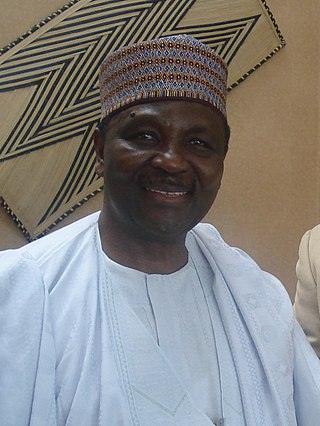
Yakubu Dan-Yumma "Jack" Gowon is a retired Nigerian army general and military leader. As head of state of Nigeria, Gowon presided over a controversial Nigerian Civil War and delivered the famous "no victor, no vanquished" speech at the war's end to promote healing and reconciliation. The Nigerian Civil War is listed as one of the deadliest in modern history, with some accusing Gowon of crimes against humanity and genocide. Gowon maintains that he committed no wrongdoing during the war and that his leadership saved the country.

Joseph Dechi Gomwalk was a Nigerian police commissioner and the first Military Governor of Benue-Plateau State after it was formed from part of Northern Region. He was executed due to his connections to Buka Suka Dimka's attempted coup against Murtala Mohammed's government.

The Independent National Electoral Commission (INEC) is the electoral body which oversees elections in Nigeria. It was established in 1998 shortly before Nigeria's transition from military to civilian rule.

Babafemi Olatunde Ogundipe was the de facto second-in-command and first Chief of Staff, Supreme Headquarters from January 1966 to August 1966 during Major General Johnson Aguiyi-Ironsi's military regime. He was Nigerian High Commissioner to the United Kingdom from September 1966 to August 1970 during General Yakubu Gowon's military regime.
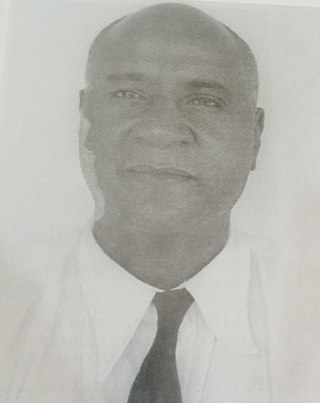
Russel Aliyu Barau Dikko (1912–1977) was a Nigerian medical doctor who was a former federal commissioner for Mines and Power and was the first medical doctor from Northern Region, Nigeria.

Turai Umar Musa Yar'Adua is the widow of the former Nigerian president and former Katsina State Governor, Umaru Musa Yar'Adua. She was the First Lady of Nigeria from 2007 until the death of her husband on 5 May 2010.
Wusasa is a town just outside the major city of Zaria in Kaduna State in Northern Nigeria.

Mobolaji Olufunso Johnson was a Nigerian Army Brigadier who served as Military Administrator of the Federal territory of Lagos from January 1966 to May 1967 during the military regime of General Aguyi-Ironsi, and then as Governor of Lagos State from May 1967 to July 1975 during the military regime of General Yakubu Gowon. As Governor of Lagos, his administration supervised the unpopular demolition of the Ajele Cemetery in the early 1970s.
Abdullahi Shelleng was the first Military Governor of Benue State, Nigeria from 3 February 1976 to July 1978 during the military regime of General Olusegun Obasanjo, after Benue State had been split from the old Benue-Plateau State.
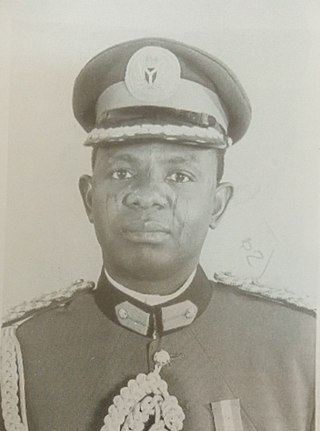
Abba Kyari was a Nigerian military officer who served as governor of North-Central State, Nigeria after it was created from the Northern Region during the military regime of General Yakubu Gowon.

Attahiru Muhammadu Jega is a Nigerian academic and former vice-chancellor of Bayero University, Kano. On 8 June 2010, he was nominated by then President Goodluck Jonathan as the new Chairman of the Independent National Electoral Commission (INEC), subject to Senate confirmation, as a replacement foProfessorProfessoror Maurice Iwu, who vacated the post on 28 April 2010. Jega retired on 30 June 2015, handing over his position to Amina Zakari according to a directive by President Muhammadu Buhari.

The Cathedral Church of Christ Marina, Lagos is an Anglican cathedral on Lagos Island, Lagos, Nigeria.

Mohammed Shuwa was a Nigerian Major General and the first General Officer Commanding of the Nigerian Army's 1st Division. Shuwa commanded the Nigerian Army's 1st Division during the Nigerian Civil War. He was murdered in Maiduguri by suspected Boko Haram sect on 2 November 2012.

Ibrahim Bata Malgwi Haruna is a retired officer of the Nigerian Army. He was a Federal Commissioner for Information and Culture between 1975 and 1977. He was also the Chairman, Executive Council, of Arewa Consultative Forum from 2009 to 2012. He holds the traditional title of Walin Garkida. He has notably been accused for ordering the Asaba Massacre, an atrocity committed during the Nigerian Civil War, but this is actually untrue; the massacre was ordered by Ibrahim Taiwo, as Haruna was not in command at that area. See Elizabeth Bird and Fraser Ottanell's "The Asaba Massacre: Trauma, memory, and the Nigerian civil war", pp. 77.

Bamidele Abiodun is a Nigerian businesswoman, philanthropist and wife of Dapo Abiodun, governor of Ogun State, Nigeria.
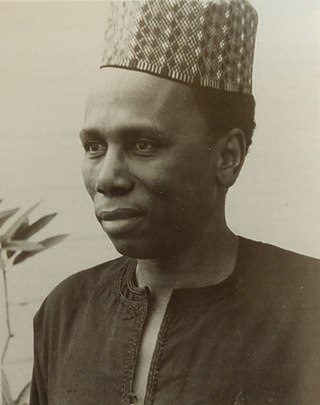
Ahmed Joda OFR, CON, CFR was a Nigerian administrator who rose through the administrative cadre of the Northern regional government and then the federal civil service to retire as Permanent Secretary, Ministry of Industries. During the administration of the youthful Yakubu Gowon, he was considered to be among a group known as super Permanent Secretaries.
Esther Oluremi Obasanjo also known as Mama Iyabo is a former Nigerian First Lady. She was previously married to President Olusegun Obasanjo.
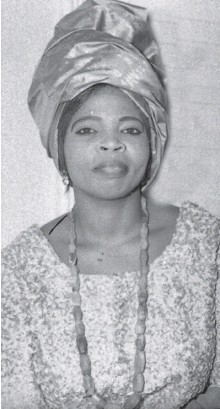
Victoria Nwanyiocha Aguyi-Ironsi was the second First Lady of Nigeria from 16 January 1966 to 29 July 1966.
















